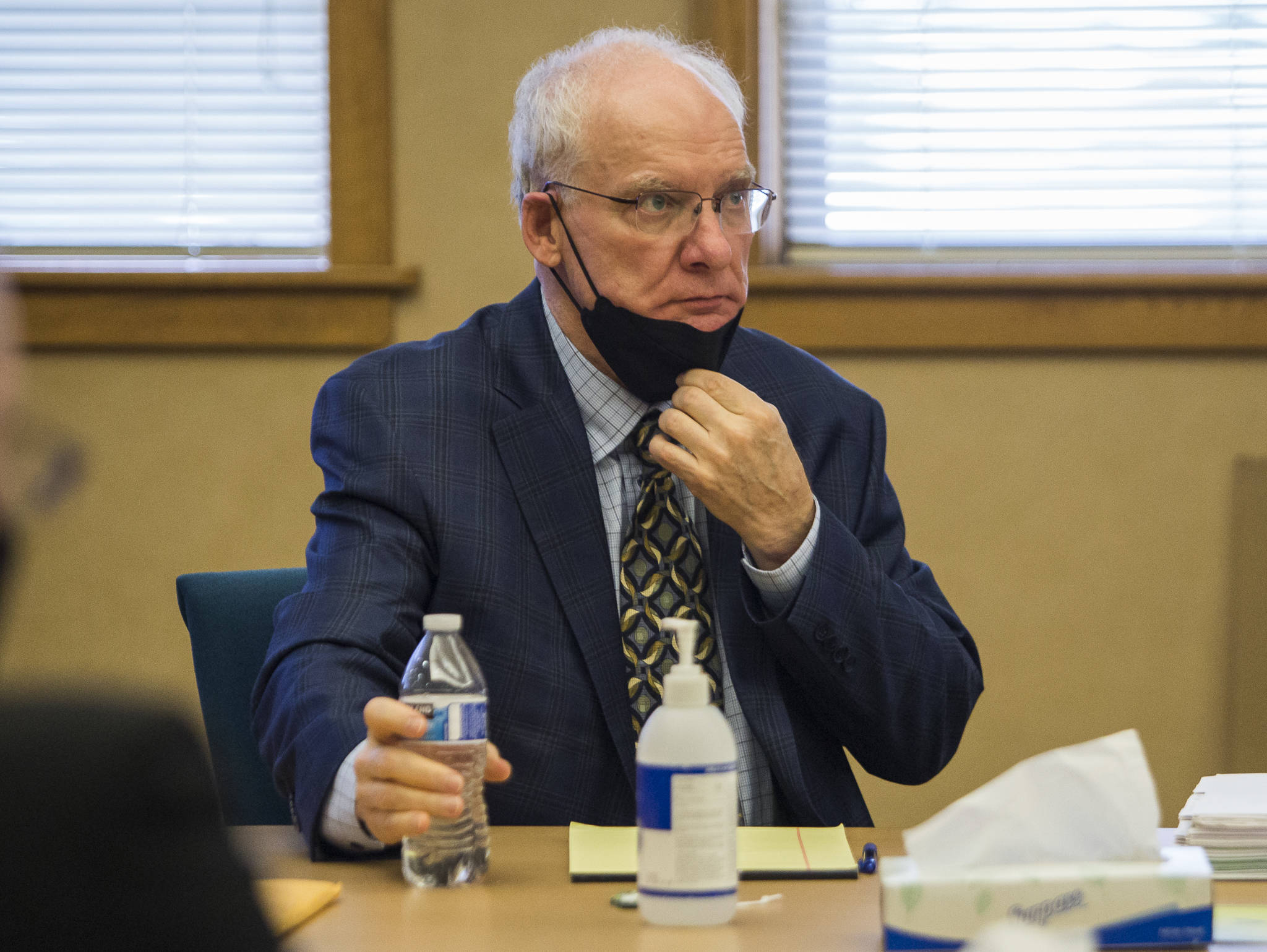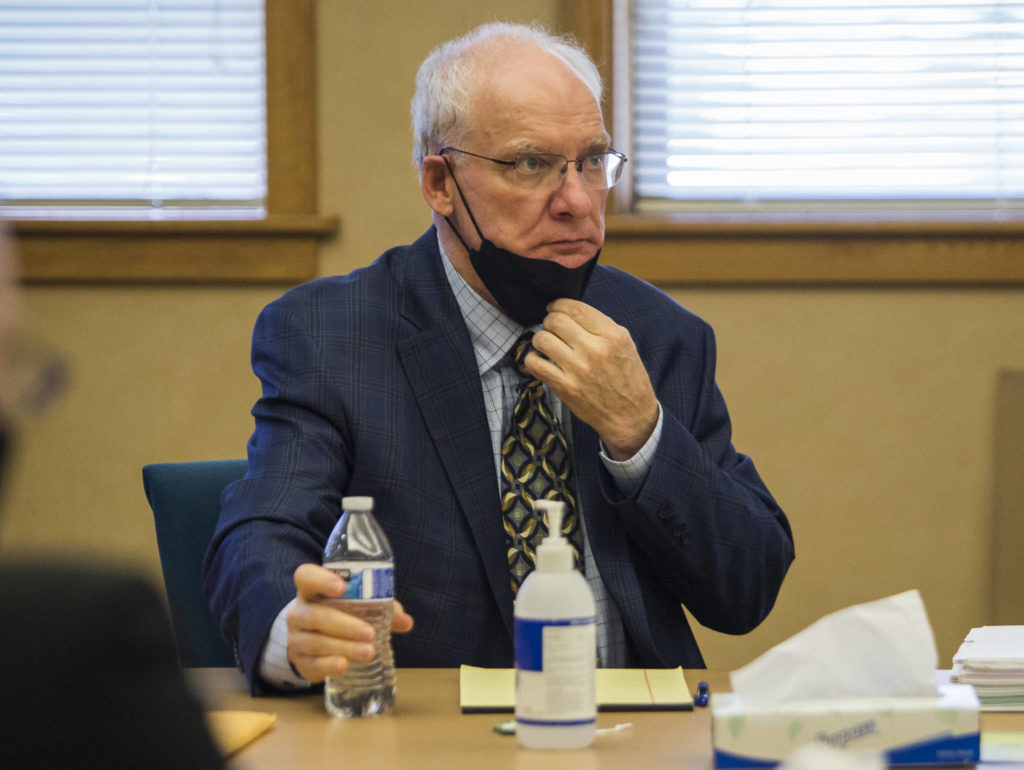EVERETT — In 1991, a jury acquitted Simeon Berkley in a shooting that paralyzed a man following a near-crash on a California freeway.
Thirty years later, he’s on trial again, this time for second-degree murder. A Snohomish County jury will decide if Berkley, 75, acted out of road rage or self-defense in a shooting July 6, 2019, that left an Everett man dead.
Berkley was driving a Honda Accord around 7 p.m. that night when a Lincoln Navigator rear-ended him on Glenwood Avenue, according to charging papers. Berkley got out of his car and walked over to the Navigator while the other driver, Steven Whitemarsh, 49, remained in the front seat, according to witness testimony last week in Snohomish County Superior Court.
The two men appeared to have brief conversation through the open window, witnesses testified. Berkley then shot Whitemarsh in the face. One witness testified that a few seconds passed before Berkley fired a second bullet.
First-responders found Whitemarsh still strapped in his seatbelt. He was pronounced dead soon afterward.
Whitemarsh, a father of three, worked as a manager at a local Safeway. His family described the man they lost as “a great friend, co-worker, dad, son and brother” in a statement in 2019.
Berkley’s attorney argued last week that the case is about self-defense.
“It’s about fear,” defense attorney Laura Shaver told the jury. “It’s about danger, and it’s about making life or death situations in a very, very short amount of time.”
After the shooting, witness Beau Reeder repeatedly questioned the defendant about what happened and where the gun was. Reeder testified that Berkley told him, “Don’t worry about him. I shot him twice in the head.”
“The guy seemed calm,” Reeder said on the witness stand. “Super calm.”
An internal diagnostic report recorded by Berkley’s car showed that, three seconds before the crash, he was going 60 mph, Snohomish County deputy prosecutor Matt Hunter told the jury in his opening statement Wednesday.
The speed limit on that stretch of Glenwood is 35 mph.
Another witness, Yuriy Gogun, testified there was no way Whitemarsh could have avoided crashing into the Honda.
“It slowed down quite abruptly and there was no room for the other car to bypass — that’s why the other car hit him,” Gogun told the court through a Russian interpreter.
Prosecutors argued Berkley slammed on the brakes intentionally, and that the shooting was caused by his road rage.
“Tempers have consequences, and when two tempers literally collided … the outcome was deadly serious,” Hunter said in his statement.
Berkley’s attorney said her client feared for his life that night and was protecting himself.
“A lot of the evidence that Mr. Hunter outlined is not in dispute,” Shaver said in her opening statement.
However, the defense claimed Berkley tried to slow down and stop on the side of the road to let Whitemarsh pass before the crash. Shaver noted the tires of the defendant’s car were pointed toward the road’s right shoulder, suggesting his intent to pull over.
“At this point, (Berkley) is feeling like, ‘This guy is chasing me, he’s after me, he wants to hurt me,’” Shaver said.
Attorneys agreed to refrain from mentioning certain information about Whitemarsh and Berkley in front of the jury.
For example, an autopsy showed Whitemarsh had a blood-alcohol concentration of 0.195, more than two times the legal limit. And in 2017, Whitemarsh was involved in a fatal crash involving a pedestrian, according to a report in a defense memorandum filed by Shaver.
Whitemarsh was never charged with killing the pedestrian, however, in part because Everett police could not retrieve collision data from his Lincoln Navigator, the memorandum states.
Jurors also won’t hear about how, a little more than 30 years ago, Berkley shot and paralyzed a man after a near-collision on I-8 in San Diego County, according to a story in the Los Angeles Times. Berkley claimed self-defense in that case, too. A jury acquitted him of attempted murder, but in a surprise public statement, some jurors offered advice to the defendant after a trial.
“You keep that gun out of your car,” an unidentified juror told him, according to the Los Angeles Times story. “We didn’t feel that what you did was right at all, but we had to follow the law.”
Now, another jury will decide whether or not Berkley will walk free again.
Ellen Dennis: 425-339-3486; edennis@heraldnet.com; Twitter: @reporterellen
Talk to us
> Give us your news tips.
> Send us a letter to the editor.
> More Herald contact information.



























